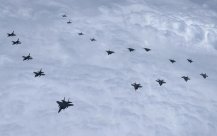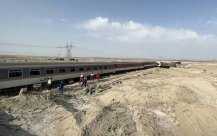The report pointed out that Iran has played a key role through influence operations and attracting third -party forces to compete with the enemy (Saudi Arabia), while the Iranian Revolutionary Guard's execution of overseas combat Holy City Brigade plays a key role.
(London) Report by the Institute of International Strategy (IISS) of the British Think Tank pointed out that Iran has occupied the upper hand in the strategic struggle of the influence of Saudi Arabia in the Middle East, because Iran has established an agency network in the region, against Syria, Syria, and Syria,The internal affairs of Lebanon, Iraq, and Yemen have certain influence.
This 217 -page report entitled Iran's influence network in the Middle East, explaining the extension of Iran's influence in the region, and the balance of power in the Middle East became beneficial to it.
The report pointed out that Iran is to compete with the enemy's superior conventional troops through influence operations and attracting third -party forces.Essence
Shengcheng Brigade and his leader Suleimani directly listened to Hamenei, the highest leader of Iran, bypassing the regular military system of Iran, basically independent individuals.
Since the former Iraq President Saddam was overthrown in 2003, the Holy City Brigade has actively moved around the Middle East to provide training, funds and weapons for non -national organizations alliance with Tehran.
The Shengcheng Brigade also uses unconventional asymmetric combat methods, such as dense tactics, using drones and launching network attacks, which means that even when facing opponents with expensive Western weapons, Iran can offset enemy forces.Military advantages.
In September this year, Saudi oil facilities were attacked by drones and missiles, highlighting the vulnerability when the Persian Gulf countries faced such as symmetrical combat methods.
Another think tank European Foreign Relations Committee pointed out: In terms of conventional weapons, Iran cannot compete with Saudi Arabia. Therefore, it must use asymmetric tools to protect its interests and fight foreign threats.
The think tank believes that compared to Saudi Arabia, Iran obviously supports the right organization in the military war to help it win this battle.Taking Iraq as an example, Iran used the religion and cultural connection with Shiites in Iraq to become a dominant force in Iraq.Iran armed and trained a militia organization called the People's Mobilization Force to help crack down on Islamic State Organization.
In Syria, Iran assisted Syrian President Assad to resist the rebel offensive with the support of the Altitude and other Shiites fighters, as well as the Russian Air Force.
The report of the Institute of International Strategy pointed out that Iran also involved in the Yemen War and provided advanced weapons for the Houthi armed forces. In addition to hoping to get Saudi Arabia, it also hoped to establish a military existence in a strategic Mande Strait.
The report believes that as long as US President Trump continues to stay in the White House, Iran is unlikely to change the string, and will continue to seek opportunities to expand its third -party forces.
Iran's agent network in the Middle East is extremely wide. It is very widely distributed in the geographical location. As long as it choose to attack, its agent can dispatch missiles and drones at any time to launch attacks. It can also ambush the U.S. forces in Iraq, disrupt HolmuszzMaritime traffic in the strait, or advanced network attacks on the Arab countries in Israel or Persia.
The report from the Institute of International Strategy pointed out that although the US sanctions on Iran have affected its economy, the agent forces established by the Saint City Brigade in the Middle East allowed Tehran to achieve the highest benefits at the lowest cost and become one that cannot be ignored.Stock power.




